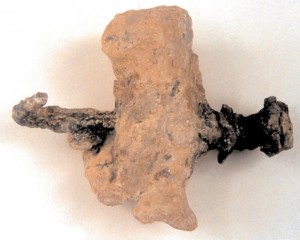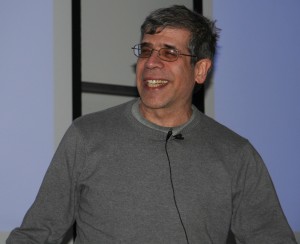 The “Legendary Jesus” hypothesis, which argues that Jesus of Nazareth never existed, faces several powerful objections. First, it cannot explain away the evidence from non-Christian sources. Second, it cannot explain why Christianity’s Roman and Jewish opponents never finished off the Christian faith by demonstrating that Jesus did not appear in the official records and pointing out that there was no memory of Jesus in the relevant locales. Christian apostles and apologists never even had to respond to so much as a rumour that Jesus didn’t exist!
The “Legendary Jesus” hypothesis, which argues that Jesus of Nazareth never existed, faces several powerful objections. First, it cannot explain away the evidence from non-Christian sources. Second, it cannot explain why Christianity’s Roman and Jewish opponents never finished off the Christian faith by demonstrating that Jesus did not appear in the official records and pointing out that there was no memory of Jesus in the relevant locales. Christian apostles and apologists never even had to respond to so much as a rumour that Jesus didn’t exist!
Third, the Legendary Jesus hypothesis overlooks abundant evidence that the synoptic Gospels contain accurate information about Jesus; we’ll return to this point later in the article. But finally, and crucially, the Legendary Jesus hypothesis cannot explain why Christian would shift from belief in a mythical Christ to an historical Christ. Suppose the shift was the result of a deliberate conspiracy. Why would the conspirators open their message to refutation in this way? And why invent a crucified messiah when the very notion seemed risible to the Hellenists and blasphemous to the rabbis? Suppose the shift was accidental. How could the first Christians forget that a man called Jesus was not born during the troubled years that surrounded the death of Herod the Great? How could they forget that he was not crucified by a notorious prefect named Pilate?
 Jerry Coyne, who is rather sceptical that an historical Jesus of Nazareth existed, believes that he has an answer to that question. Relying on an article which is itself a description and critique of another scholar’s work, Coyne believes
Jerry Coyne, who is rather sceptical that an historical Jesus of Nazareth existed, believes that he has an answer to that question. Relying on an article which is itself a description and critique of another scholar’s work, Coyne believes
…that recent work on fallible human memory shows that even in a short time so-called “eyewitness accounts”—these constitute the bulk of the oral Biblical evidence for Jesus—can be corrupted beyond recognition. that further means is that over the four or five decades spanning the reported date of Jesus’s death and the first written scriptural account of his deeds (the Gospel of Mark) the Story of Jesus could involve not just severe distortion, but even fabrication. That is, Jesus could be the subject of False Memory Syndrome.
Coyne is relying on Brian Bethune’s article “Did Jesus Really Exist?” in which Bethune criticises the views of New Testament scholar Bart Ehrman. Ehrman believes that recent studies on the reliability of human memory demonstrate that much of the information in the Gospels cannot be trusted. Ehrman’s claims are quite controversial; but Bethune argues that Ehrman does not go far enough. He believes – and Coyne concurs – that human memory is so unreliable that nothing in the Gospels can be trusted! In fact, the first disciples imagined that Jesus existed; they literally forgot that Jesus was not real.
Now, some of Bethune’s arguments are rather embarrassing. He notes that “Pilate is the sole figure from Jesus’s trial for whom we have undoubted archaeological evidence”. So what? Does Bethune doubt the existence of Caiaphas or Herod Antipas? He uses information from the Gospel of Peter (written between 150-190) as a reliable source for the beliefs of the first Christians. He treats Richard Carrier as a mainstream scholar, without referencing any of the significant criticisms of Carrier’s arguments.
His discussion of the evidence from the social sciences is also remarkably cavalier. As recent work by the Open Science Collaboration has demonstrated, we need to be extremely careful when generalising from psychological experiments. Results are often difficult to replicate; moreover, many experiments create unusual circumstances and are carried out with small sample sizes drawn from college students. It is best not to generalise to real life – or historical – settings without careful argument.
Experiments which show that memory can be reliable must be balanced against evidence that both memory, and eyewitness testimony, often track the truth. We have all read horror stories about eyewitnesses misidentifying suspects. However, John T Wixted points out that often these eyewitnesses initially do not express a great deal of confidence in their identification. Eyewitnesses who demonstrate a great deal of initial confidence are usually correct.
Furthermore, the media tends to focus on scare stories of misidentification. We rarely hear about cases which illustrate impressive feats of memory. For example, estate agent Stephanie Slater was blindfolded when she was kidnapped. However, when carefully interviewed, Stephanie was able to tell police that she remembered hearing trains going by, the ring of an old fashioned style telephone, the smell on the kidnapper’s clothes, the feel of walking on cobbled stones and thick rope being used to tie her up. All of this information led to the discovery, identification and conviction of her kidnapper.
In any case, we should not be thinking of panicked eyewitnesses to traumatic events when we are considering the testimony used to create the Gospels. Nor should we be pondering the minds of college students performing some unusual or highly artificial task. Jesus was a teacher; he and his disciples would have used methods analogous to rote learning to preserve his message. Anyone who has learned a nursery rhyme, a fairy tale or the alphabet can testify to the reliability of such methods.
Writing supplemented and aided this process of memorisation. Wax and leaf-ink tablets could be used for note taking. There was also a sophisticated scribal culture in Israel, particularly in Jerusalem, and some of Jesus wealthier followers would have had reasonable reading and writing skills. As Ben Witherington III responds to Ehrman’s charge that the first disciples were all “illiterate peasants”:
First of all fisherman are not peasants. They often made a good living from the sea of Galilee, as can be seen from the famous and large fisherman’s house excavated in Bethsaida.
Secondly, fishermen were businessmen and they had to either have a scribe or be able to read and write a bit to deal with tax collectors, toll collectors, and other business persons.
Thirdly, if indeed Jesus had a Matthew/ Levi and others who were tax collectors as disciples, they were indeed literate, and again were not peasants. As the story of Zaccheus makes perfectly clear, they could indeed have considerable wealth, sometimes from bilking people out of their money.
In other words, it is a caricature to suggest that all Jesus’ disciples were illiterate peasants. And Bart is absolutely wrong that Acts 4.13 says otherwise— what Acts 4.13 says is that the council is shocked at the theological capacity of Peter and John because they are ‘unlettered’. This is not the ancient word for illiterate, it is the word for not being learned, not having done formal school training, say in a synagogue.
And if rote learning, oral traditions and note taking could be used to preserve Jesus’ teachings, they could also be used to preserve key episodes from his life.
The testimony of specific eyewitnesses and the memories of the first groups to follow Jesus would act as a control on these sources. And the evidence suggests that Matthew, Mark and Luke drew on sources written down well before the fall of Jerusalem. Even Ehrman’s scepticism – which allows that we can reconstruct the broad outline of Jesus’ life – seems completely unwarranted. So Coyne and Bethune seem positively paranoid.
Bethune and Coyne’s arguments are reminiscent of the tortured logic of Holocaust deniers. To be clear, there is no moral equivalence; but the eccentric arguments of Holocaust denial and Jesus mythicism do parallel each other at certain points. Just as Jesus was a legend created by the early church, the Holocaust was a legend created by British propagandists.
There’s hardly a German who hasn’t been listening to the BBC who hasn’t heard of the gas chambers. And they begin mentioning it in rumours to one another From one washerwoman to the next, the rumour goes around Germany, until they’ve actually seen about it and their sound’s working in a unit and he’s heard about it too. And that’s how the legend gains credibility form the German side too. Richard Evans (2002) Telling Lies About Hitler, 137
After the war the Polish government manufactured evidence to give some weight to the rumours. Irving also argued that the eyewitness testimony of Holocaust survivors should be discounted:
“I’m afraid I have to say I wouldn’t consider what a survivor of Treblinka could tell in in 1998 to be credible evidence.” Evans (2002) 140
“The eyewitnesses – Are an interesting case for the psychiatrist. People over a period of years begin kidding themselves that they have seen something.” Evans (2002) 140
[One could not rely on] “the very human and fallible memories after a tragic wartime experience forty years after the event.” Evans (2002) 140
 A discussion between Irving and a survivor of Auschwitz on an Australian television programme in 1997 is telling:
A discussion between Irving and a survivor of Auschwitz on an Australian television programme in 1997 is telling:
IRVING: You said that you saw the smoke coming from the crematoria
SURVIVOR: Absolutely
IVRING: Is that correct?
SURVIVOR: Correct.
IRVING: But crematoria don’t smoke Mrs Altman. God and visit your local crematorium in Sydney.
Here Irving believed that Mrs Altman’s memory had failed and that her imagination had created a false memory. In fact, just the opposite had been established. Crematoria in modern, urban areas do not smoke because they are designed not to upset the neighbours. The architects of Auschwitz did not need to worry about the aesthetics of cremation, and did produces smoke – unlike every other crematoria Mrs Altman would have experienced. Her memory of the smoke established that her testimony was reliable.
Once more, the problem is not that Coyne and Bethune are advancing a theory as pernicious as Holocaust Denial. The point is that Coyne and Bethune’s extreme scepticism towards memory and oral history would lead us to reject the testimony of those who have survived – and perpetrated – some of history’s worst atrocities. We rob historians of vital sources: We cannot understand the transatlantic slave trade, for example, without the testimony of men who experienced the Middle Passage. But men like Oloudah Equiano or Alexander Falconbridge gave their testimony decades after their journeys.
No-one is suggesting that testimony, oral history and cultural memory should be approached naively or uncritically. But no-one can seriously suggest that historians cannot use these to reconstruct the past. Bethune and Coyne’s scepticism – if consistently held – would lead to an extreme relativism in history – a relativism which neither would tolerate in the physical or social sciences (in fact, both seem to be naïve realists when interpreting the data presented by Ehrman).
Coyne suggests that mainstream scholarship is labouring under a cultural bias when it asserts that there is more than enough evidence for Jesus’ existence. We have pointed out that at least two non-Christian sources (which Coyne would anachronistically describe as “secular”) provide more than enough evidence. But Coyne thinks it is worried that the best sources for Jesus- the Gospels – are biased.
That is, quite frankly, hilarious. Most ancient histories wear their bias on their sleeves! (Polybius and Josephus both had powerful Roman patrons, for example). We should worry less about bias and ask what information can be reliably reconstructed from the source. Does it contain reliable information despite the motivations of the author? And the evidence is that the Gospel writers could access facts about Jesus and wanted to preserve the truth about him.
The Gospels include a lot of information that the Church was unlikely to invent—for example Peter’s denial and Judas’ treachery. It is also remarkable that the Gospels say very little about the issues that vexed the earliest Churches. The first Christian communities were bitterly divided over relationships between Jewish and Gentile Christians. Yet Jesus says nothing about circumcision and little about how Gentiles should treat the Old Testament law. If the early Church was in the habit of inventing stories, why did it not settle these disputes by fabricating a parable or two?
Gerd Thiessen in The Shadow of the Galilean points out that many texts in the Gospels demonstrate knowledge of Palestine in third decade of the first century. For example Matthew 11v 7 demonstrates knowledge that Herod Antipas stamped the image of a reed on his coins; Matthew 15 v 26 can only be understood when we know that that the Jews of Galilee made bread for the rich of Tyre. Unless one had knowledge of how territories were divided during Jesus’ lifetime, one would not know that taxes were collected in Jericho and Capernaum.
Furthermore, the Gospels preserve teaching which was not relevant to the 70s and 80s. Why create a teaching about the Temple tax, or about forgiving your brother before you offer a sacrifice, when most of your readers had no access to the Temple? Why include a prophecy that tells Christians living near Jerusalem how to act in the face of an impending Roman invasion? These passages became completely irrelevant after the Roman-Jewish war and the destruction of the Temple in AD70. The best explanation for these passages is that they preserve teachings which go back to Jesus.
Just how reliable one considers the Gospels to be will, inevitably, depend on one’s religious and philosophical opinions. A scholar who believes that that miracles are impossible can do little more than concede that Jesus first followers believed He was a wonder worker; a scholar who believes that there is a God will be more open to evidence that certain stories are reliable. But even scholars as sceptical as Ehrman and the Jesus Seminar conclude that many passages contain solid information about Jesus.
We are not examining the claim that a few select individuals had a private experience of an angel, or that they hid golden tablets in a secret location, or that one man had a vision of a fallen alien empire. We are examining the claim that religious teacher named Jesus had a public ministry in Galilee and Jerusalem and that he was crucified by Pilate (a claim made in every early source which describes the crucifixion!) in Jerusalem during Passover.
The evidence from the Gospels alone should convince a reasonable person of these claims. If he is not now convinced of those innocuous facts, I expect he can never be persuaded – not even if he should see someone rise from the dead.

